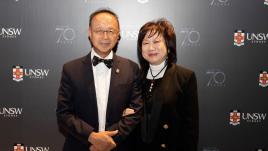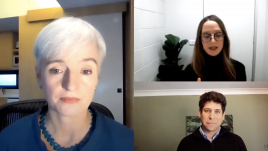The unexpected benefits of learning in lockdown
Professor Pasi Sahlberg shares how to make the most of lockdown conditions to enhance your children’s education (and your sanity).
If you are a stressed parent or carer who has felt overwhelmed by the experience of your child or children learning from home during COVID-19, you’re not alone.
Parents across Australia have taken to social media these past weeks to express anxieties about their newfound teaching responsibilities, as many have felt ill-equipped to support their children’s learning at home. However, a UNSW education expert says parents should cut themselves some slack, advising that a break from traditional education structures can be a wonderful thing for a child’s development.
Professor Pasi Sahlberg, global thought-leader in education and former schoolteacher in Finland, assures parents that it doesn’t matter if you don’t ace teaching, and here’s why:
Your job is to be a parent, not a teacher
While children are learning from home, it’s important that parents realise that schools are still open and ultimately responsible for a child’s learning – they just aren’t doing it in the same building, says Professor Sahlberg.
“Teaching is a very complex process, so parents should not feel they should teach in the same way as professionals (unless of course they are teachers themselves),” he says. “If your child has an aching tooth, you would not be expected to fix it if you’re not a dentist. In both situations, the best thing you can do for your child is to try to ease the discomfort, and seek help from the experts.”
Your children’s education won’t suffer
Professor Sahlberg says parents should not worry about their children being “left behind” as regular schoolwork is disrupted.
“Most children will not suffer from being away from school for a few months. While there are some exceptions, there's no evidence to suggest it will be harmful for the majority in the long run,” he says. “Think about your own life. Many of us have been sick, travelling, or for some other reason we've been away from school and look at us. We don’t look back and blame some missed months in school for things we may not be able to do today.”
Instead, Professor Sahlberg suggests prioritising our children's wellbeing over traditional academic learning, so they are happy and safe in a situation that is also very new and even scary for them.
Remember learning never stops
Though the majority of schools are still open, Professor Sahlberg stresses that learning doesn’t just stop when kids can’t go to school.
“Kids are always learning, it’s their nature, so it’s silly to ask ‘what happens when the learning stops’, because it's not happening,” he says. Instead, consider this time an opportunity to help children discover their passions and talents. That way, even if traditional subjects like maths, science and history are challenging, kids can instead find new things they love to do, or are naturally curious about such as music or cooking.
“This gives us licence as parents to actually get to know our children better than we have known them before,” he says. “Dare to become a child again, become the learners again, and learn alongside your own children.”
Let the children play
“It’s incredible how much deep learning really happens when children play,” says Professor Sahlberg. “Often in our busy lives, we think play is a waste of time. But if you really go there – now we might have time to do that – you will find that how the kids use their imagination creatively and learn new things is just amazing.”
According to research by the UNSW Gonski Institute for Education, the best form of play is a free, unstructured play outdoors – though indoors is still meaningful.
“This type of play means that the children can decide themselves what to do and how to play, rather than adults giving them rules and structure. It is something that raises their curiosity; it's joyful and invites children to use their own imagination,” he adds.
Through this, children can enhance their emotional, social and also cognitive development – in other words, skills that will help them to learn better more broadly. This is something that is true for all of us, no matter what age.
“We hold this myth that play is only good for children in kindy or primary school but all children want to play, including young adults,” he says. “In fact, this applies to all of us from zero to 99. It is a natural form of our existence; it’s how we express ourselves.”
Human interaction should prevail in the future of education
As we move on to the post-pandemic time, from all we have learnt and experienced, Professor Sahlberg anticipates a number of heated public conversations about the future of schooling and education reform. In these scenarios, he hopes political leaders and decision-makers will take the same approach as during the COVID-19 crisis and trust in the advice of experts.
“Australian teachers, school leaders and researchers that are extremely experienced have the professional wisdom to ensure that whatever is decided at the political level will be led by the children's wellbeing and interests first,” he says.
Some have wondered if this time of lockdown may lead to a larger shift in educational practices, with a stronger reliance on technology and remote learning. Though learning to harness these tools will be beneficial, Professor Sahlberg believes it’s unlikely this will become the default (so breathe easy).
“This social experiment that we are in right now means we can learn much more about online pedagogies and virtual learning. But if we do this on a larger scale, it would undermine the real nature of learning that is based on human interaction and relationships and a shared experience with other learners,” he says.
“Things like complex problem-solving, communication, collaboration skills, leadership, empathy and self-regulation. Those things are very hard to digitise. Education happens best through human interaction.”








